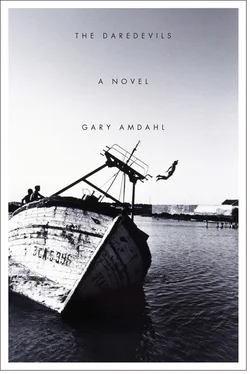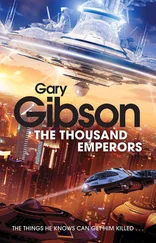“Yes, they are mad. Yes, they create reality.”
“Why did Rejean tell us he was going to shoot us, and then not do it?”
“I don’t know.”
“Did Rejean perhaps actually shoot us?”
Vera stared at Charles with a kind of languid fear that brought goose bumps out on him and made the hair on the back of his neck stand up.
“Was his intention to shoot us, and he changed his mind at the last second?”
Vera said nothing, but looked away.
“Maybe he was talking to someone else but looking at us?”
“Maybe,” said Vera, “we’ll never know.”
They were in a rented house on the other side of White Bear Lake from Commissioner Winter’s monstrous folly, and walked from the white- and gold-painted gazebo with fluttering flags of every other color to the shore. The two-bit spring had become lush and humid, balmy and four different shades of green: dark, earthy soil green; airy green that almost passed for blue; a saturated, dripping green; a startling fiery lime. The lake was still cold and a warm breeze was moving over it. There were clouds in the sky, just enough to soften the glittering of the water.
And yet it was not soft. The air was clammy and the light was sharp, like pinpricks into her sweaty eyes. To say she was tired was euphemistic to the point of falsity. She felt weak, so weak it was unpleasant to move at all, and stupid, so stupid she hated herself. These were unprecedented feelings and she would have found them frightening in their dreadful unfamiliarity had she had the strength and consequent desire to examine them. The thing, she believed, was still alive inside her, but once again she found she had no desire to contemplate it. She felt nothing. She did not want to talk to Charles. He was trying to compare life and death as he imagined it was being experienced on the Somme, for instance, with life and death as they were experiencing it. The death was methodical, he opined, and continuous and unremarkable to everyone observing the action, even the actors, whereas here the method was only just being discovered and explored, death happened unexpectedly, in clots that trailed off in streams and drips into the past. It was remarkable only insofar as it was largely unpredictable. He was remarkably tiresome and, even though she had no interest in being right, remarkably wrong: wrong to taxonomize it. She had always known how to act. She had always known how to be alive in that wholly mysterious “moment” between the past and the future, and all those things Charles had maundered on about — pretentiously or mock-pretentiously, she still did not know — in rehearsals she actually found corresponded with her truth, with her understanding of what it meant to be alive, what it had meant to be alive in every moment that she could remember having, a reality both transcendent and immanent that had been there before her birth and would be there after her death, a manifestation of which she was both the greatest instance and the greatest illusion. Death had existed only and as exactly as life had. But then she had become weak. How had that happened? She had become weak and stupid and the deaths she had witnessed had been far more real in their screaming violence than anything she could have imagined possible, far more hideous, far more terrifying. Life was everything now, and death was now torture, a torture that would deprive a person only of the means by which to live. It was eternal horror. Death had been there in the friendliest and most natural way, making life possible, continuously and eternally possible — then had suddenly become what the poor human brain, with its insistence on paired contradictions, had always suspected it was: the opposite of life, nemesis, terrifying end of life and beginning of torture, unimaginable horror becoming relentlessly imaginable, and cosmic anomie. Death had become life. When she closed her eyes all she could see were scenes of violence and degradation; and when she opened them she could see nothing except a screen on which images were projected, the shadows on the wall of the cave. shadows in the shape of people, who were pointing at her and gesturing like they had on rehearsal, demonstrating and wishing to evoke laughter, derisive, bitter, mocking, hysterical, terrifying laughter. Death had destroyed the illusion of life.
It was the vision with which Charles had been vouchsafed in 1906, when his city had vanished.
She knew nothing of this vision, and he did not think to speak of it in direct terms.
Death was everywhere and everything. How could she not capitulate to it?
It was a kind of backyard grenade, a condensed milk can with a wooden handle extending from the top. The can was filled halfway with trinitrotoluene, into which a little blasting cap of mercury fulminate was set, trailing a five- or six-second length of fuse. Five or six seconds.
One.
Two.
Three.
Four.
Five.
Six — maybe, maybe not.
Seven? Eight? Nine? Ten? Who knew? Bombs could play dead. He had seen one do so. Only to leap onstage in a blaze of light and a blare of sound! TA-DA! You gotta let me sing! On top of the TNT was poured iron scraps, all the way to the top of the can. A hole was drilled in the top for the fuse, then soldered to the can. He put it in a lunchbox and waited, in Winter’s — Winter’s, not McGee’s, the vain and arrogant man, not the ruthless mechanic — in Winter’s disturbingly empty office, waited for a man to appear. When night had fallen and passed and dawn was breaking again, he telephoned the White Bear Lake house.
Winter apparently found it effortlessly easy to accept Charles’s pose as workable: that he was a spoiled brat of a rich boy who wanted to cause trouble, be notorious and of consequence — that he was amoral and only interested in controlling powerful things. He also guessed that Winter was finding, apart from whatever he might gain by aiding and abetting the enemies of the California Progressives, the simple generic, schematic possibilities put into play irresistible: scion of wealthy do-gooder politico, secretly in the employ of nefarious foreign anarchist puppet masters, or not, double-crossing them by working for the state, or not, actually putting this playboy simpleton’s hands on a bomb in the course of an insurrection and then calling in armed troops.! What could be more fun for a man who hated people and was afraid of life? And in any case, he could get no clear word from the rest of the MCPS or the Pinkertons or the Department of Justice. There was going to be a big roundup of Wobblies and anarchists and assorted other radicals, there would be long prison terms, there would be deportment — but what to do in the meantime? That was the question. Did one sit back and let the war take over for the duration? Or did one extend and expand one’s efforts under cover of the war. Did one become less ruthless for the time being — or did one become even more ruthless? It all depended on what one hoped to get out of it.
“We’ll get you a nice little bomb,” Winter had said, trying to sound like the gruff-but-jovial McGee, “to play with.”
“Already got it,” Charles had said.
“Well, goodness gracious!”
“I said I already got it.”
“Yes, I heard you the first time.” He was finding it difficult to maintain another man’s tone.
“Well then. What do you want me to do with it?”
“Be careful with it! Don’t move. I mean: Do you have it here now?”
“I do.”
Charles patted his suitcase. The little dramas were still effective.
Suddenly May disappeared. It was as if winter had returned with Winter’s rise in the psychosphere. The temperature was in the high forties but dropped quickly all day as an immense front moved in from Canada. Charles and Vera contemplated a sky of scratched tin that became darker and heavier, as if it were undergoing a kind of geological metamorphosis. The horizon was black, and when they could see trees, the trees were like soft charcoal lines and puffs of cloud more and more obscure against the deepening blackness of the sky. Rice Park in downtown Saint Paul was full of tough-looking men by misty murky noon. They came and went as the light failed and the temperature dropped, circulating in pairs, conversing loudly in groups, smoking, hunching their shoulders, sneering and leering, cupping their hands for lights, looking uneasily or contemptuously for signs of activity, progress, peace, violence, anything moving. The light failed faster than anyone expected, and both electric and gaslights came on in the unnatural dusk, more lights than anyone had seen before in the little park. The courthouse, a quasi-gothic building on one side of the square, was lit up like a fairy castle; all its windows were ablaze and Charles, of course, imagined all kinds of dramas being enacted inside: stricken gaping misery, capricious judgment, happy endings, love, death. Opposite the courthouse, the new glistening white library was so well lit they could make out the stacks inside. On a third side, the Saint Paul Hotel, in which they had lunched with his family what seemed like years before, was warm and luxurious looking, the patrons of that excellent restaurant peering at the strikers through great walls of glass. Charles thought it was like they were eating dinner in a glass cage, their faces orange in the candlelight. Along the last side of the park, the Hamm Theater’s doormen opened the way to people who were visibly eager to see — he could not believe his eyes when they first fell on the marquee— The American.
Читать дальше












